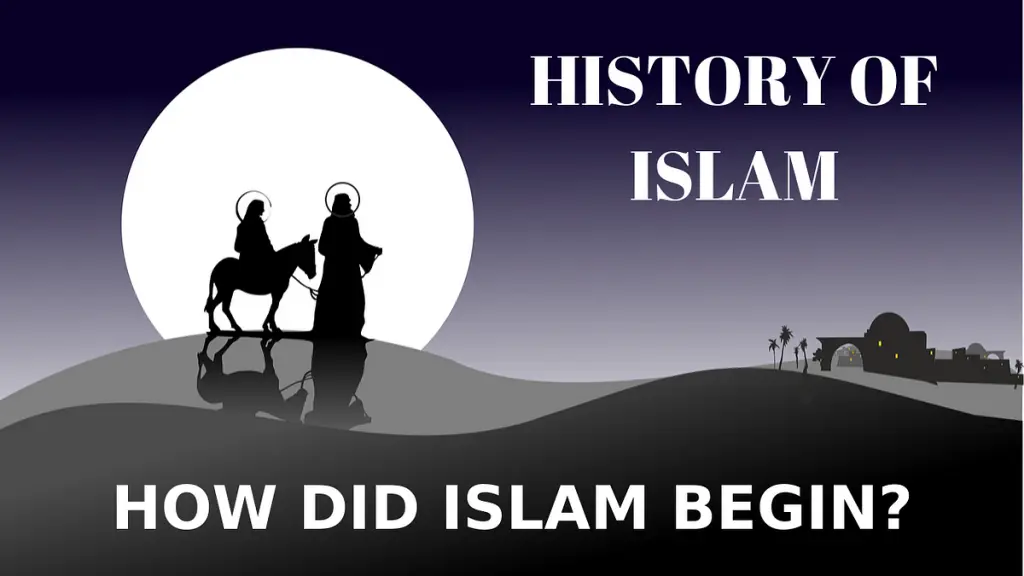“Discover Where Did Islam Begin?: Explore the Historical Birthplace of Islam. Uncover the Rich History of Islam’s Beginnings in this Comprehensive Guide. Learn About the Holy City of Mecca and its Significance in Islamic History. Gain Insight into the Life of Prophet Muhammad and the Early Islamic Community. Start Your Journey into the Roots of Islam Today!
In the annals of history, few events have shaped the world as profoundly as the birth and spread of Islam. This religion, followed by over a billion people today, has a rich and complex history that traces its origins to a specific time and place. In this article, we will delve into the intriguing question: Where did Islam begin?
The Birthplace of Islam: Mecca

At the heart of Islam’s origin lies the ancient city of Mecca located in present-day Saudi Arabia. Mecca holds immense significance as the birthplace of the Prophet Muhammad who is considered the last and final prophet in Islam. Born in the year 570 CE Muhammad spent his early years in Mecca.
The Kaaba – The Holiest Shrine
Central to Mecca’s importance in Islamic history is the Kaaba a cube-shaped building located within the Masjid al-Haram (the Sacred Mosque). Muslims around the world face the Kaaba during their daily prayers. It is believed that the Kaaba was built by the Prophet Ibrahim (Abraham) and his son Isma’il (Ishmael) and later restored by the Prophet Muhammad and his followers.
The Revelation: The Cave of Hira
One of the pivotal moments in Islamic history occurred in the Cave of Hira, a small cave in the mountains near Mecca. It was here that the Angel Gabriel appeared to Muhammad, delivering the first verses of the Quran. This event known as the first revelation marks the beginning of Islam’s prophethood and the spread of its message.
The Quran – Islam’s Holy Book
The Quran considered the holy book of Islam, is believed to be the word of God as revealed to Muhammad. It serves as the guiding light for Muslims, providing instructions on matters of faith, morality and conduct. The revelation of the Quran continued over 23 years, shaping the core beliefs and practices of Islam.
The Migration to Medina
As Islam began to gain followers in Mecca the new faith faced opposition and persecution. In 622 CE, Muhammad and his followers embarked on the Hijra, or migration to the city of Yathrib later known as Medina. This marks the beginning of the Islamic lunar calendar and is considered a turning point in the history of Islam.
The First Mosque – Quba Mosque
In Medina the first mosque of Islam the Quba Mosque, was built. It symbolizes the importance of community and worship in Islam. Muslims gather in mosques for prayers community gatherings and learning.
The Conquest of Mecca
After years of struggle and conflict Muhammad and his followers returned to Mecca in a triumphant event known as the Conquest of Mecca in 630 CE. The city embraced Islam and the Kaaba, once a center of idol worship was cleansed and rededicated to the worship of the one true God.
The Farewell Pilgrimage
In his final years, Muhammad performed the Hajj pilgrimage, which is one of the Five Pillars of Islam. This pilgrimage retraces the steps of the Prophet Ibrahim and is a powerful symbol of unity among Muslims worldwide.
Conclusion
In conclusion, Islam began in the city of Mecca, where the Prophet Muhammad received the divine revelations that form the foundation of the Islamic faith. Mecca and Medina, two cities in modern-day Saudi Arabia, hold immense spiritual significance for Muslims around the world. Islam’s birth and spread are intertwined with these sacred places, and they continue to shape the beliefs and practices of billions of people.
FAQs
- What is the significance of the Cave of Hira?
- The Cave of Hira is where the Prophet Muhammad received the first revelations of the Quran, marking the beginning of Islam’s prophethood.
- Why is Mecca important in Islam?
- Mecca is the birthplace of the Prophet Muhammad and home to the Kaaba, the most sacred shrine in Islam.
- What is the Hijra in Islamic history?
- The Hijra refers to the migration of the Prophet Muhammad and his followers from Mecca to Medina in 622 CE, a significant event in Islamic history.
- What is the significance of the Quba Mosque?
- The Quba Mosque in Medina is the first mosque in Islam and symbolizes the importance of community and worship in the faith.
- What is the Hajj pilgrimage, and why is it important?
- The Hajj is an annual pilgrimage to Mecca that retraces the steps of Prophet Ibrahim and is one of the Five Pillars of Islam, emphasizing unity among Muslims.